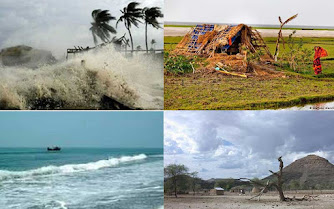Climate Change Impacts on Bangladesh
Climate change poses significant challenges for Bangladesh, a low-lying country situated in the delta of major rivers like the Ganges and Brahmaputra. Here's a brief overview of the impacts:
Rising sea levels threaten to inundate vast coastal areas, displacing millions of people and leading to the loss of valuable agricultural land. Saltwater intrusion into freshwater sources jeopardizes drinking water supplies and agricultural productivity, exacerbating food insecurity in a country where agriculture is a primary source of livelihood.
Extreme weather events, including cyclones and floods, have become more frequent and severe due to climate change. These events result in loss of lives, destruction of infrastructure, and disruption of economic activities. The vulnerability of Bangladesh's population to such disasters is compounded by high population density and inadequate infrastructure.
Changes in temperature and precipitation patterns affect agricultural productivity, with implications for food security and livelihoods. Erratic rainfall patterns lead to droughts or floods, damaging crops and reducing yields. This threatens the livelihoods of millions of farmers and contributes to rural poverty.
Climate change also impacts public health in Bangladesh. Rising temperatures create favorable conditions for the spread of vector-borne diseases like malaria and dengue fever. Increased flooding can lead to waterborne diseases and malnutrition due to food shortages, particularly among vulnerable populations such as children and pregnant women.
Addressing these challenges requires both mitigation and adaptation efforts. Bangladesh has made significant strides in disaster preparedness and response, including early warning systems and resilient infrastructure. Additionally, investments in renewable energy and sustainable agricultural practices can help mitigate greenhouse gas emissions and build resilience to climate impacts.
International cooperation and support are crucial for Bangladesh to effectively tackle climate change. Developed countries, as major contributors to greenhouse gas emissions, have a responsibility to provide financial assistance and technology transfer to help vulnerable countries like Bangladesh adapt to and mitigate the impacts of climate change.




No comments